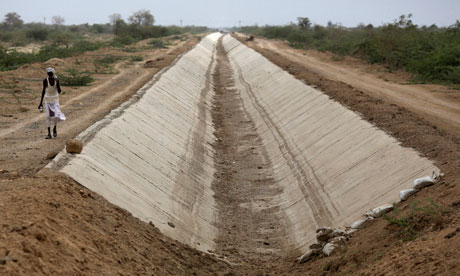The latest predictions on climate change should shock us into action...

A villager walks next to a dried Amrapur branch canal near Santalpur village in the western Indian state of Gujarat. Photograph: Ahmad Masood/Reuters
The question about climate change is no longer whether it is real. The question is what the world is going to look like for our children as they grow up. I have a three-year-old son, and, when he is my age, he could be living in a world that is completely different from ours, largely because of climate change.
Despite the global community's best intentions to keep global warming below a 2C increase from the pre-industrial climate, higher levels of warming are increasingly likely. Scientists agree that countries' current emission pledges and commitments under the UN Framework Convention on Climate Change would most likely result in 3.5-4C warming. And the longer those pledges remain unmet, the more likely it is that we will be living in a world that is four degrees warmer by the end of this century.
The World Bank Group commissioned a report by the Potsdam Institute for Climate Impact Research to help us understand the science and the potential impact on good economic development of a 4C increase. Launched on Monday, the scenarios in the report are devastating: the inundation of coastal cities; increasing risks for food production, potentially leading to higher malnutrition rates; many dry regions becoming dryer, and wet regions wetter; unprecedented heatwaves in many regions, especially in the tropics; substantially exacerbated water scarcity in many regions; increased frequency of high-intensity tropical cyclones; and irreversible loss of biodiversity, including coral reef systems. Some of the most vulnerable cities are in Mozambique, Madagascar, Mexico, Venezuela, India, Bangladesh, Indonesia, the Philippines and Vietnam.
And, most important, a world that is 4C warmer is so different from the current one that it comes with high uncertainty and new risks that threaten our ability to anticipate and plan for future needs. The lack of action on climate change not only risks putting prosperity out of reach for millions of people in the developing world; it also threatens to roll back decades of sustainable development.
Despite the global community's best intentions to keep global warming below a 2C increase from the pre-industrial climate, higher levels of warming are increasingly likely. Scientists agree that countries' current emission pledges and commitments under the UN Framework Convention on Climate Change would most likely result in 3.5-4C warming. And the longer those pledges remain unmet, the more likely it is that we will be living in a world that is four degrees warmer by the end of this century.
The World Bank Group commissioned a report by the Potsdam Institute for Climate Impact Research to help us understand the science and the potential impact on good economic development of a 4C increase. Launched on Monday, the scenarios in the report are devastating: the inundation of coastal cities; increasing risks for food production, potentially leading to higher malnutrition rates; many dry regions becoming dryer, and wet regions wetter; unprecedented heatwaves in many regions, especially in the tropics; substantially exacerbated water scarcity in many regions; increased frequency of high-intensity tropical cyclones; and irreversible loss of biodiversity, including coral reef systems. Some of the most vulnerable cities are in Mozambique, Madagascar, Mexico, Venezuela, India, Bangladesh, Indonesia, the Philippines and Vietnam.
And, most important, a world that is 4C warmer is so different from the current one that it comes with high uncertainty and new risks that threaten our ability to anticipate and plan for future needs. The lack of action on climate change not only risks putting prosperity out of reach for millions of people in the developing world; it also threatens to roll back decades of sustainable development.
http://www.guardian.co.uk/global-development/poverty-matters/2012/nov/19/latest-predictions-climate-change-shock-action
http://www.youtube.com/watch?v=XqquUtgdq0A&feature=fvsr Climate Change in New Zealand
Ecospree







2 Comments:
I agree the weather is changing worldwide, it's confirmed it's getting weirder and events are now that much more severe. We've just had the wettest year ever in Britain, the veggies have certainly suffered.xxxxx
p.s, I can't subscribe here and would like to.xxxxx
Post a Comment
Subscribe to Post Comments [Atom]
<< Home